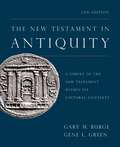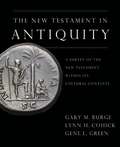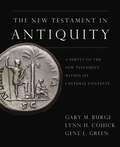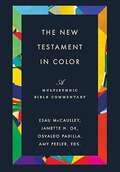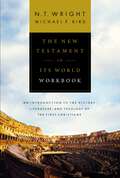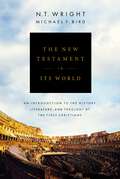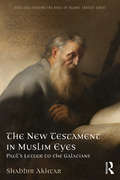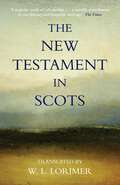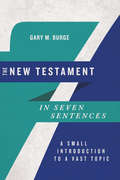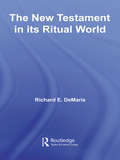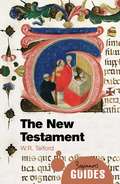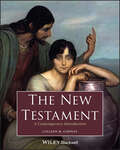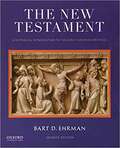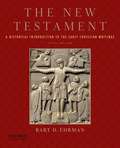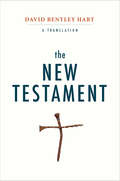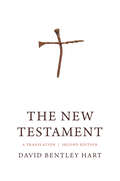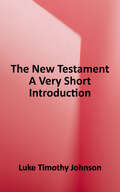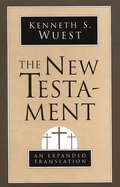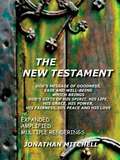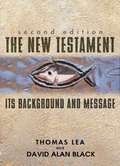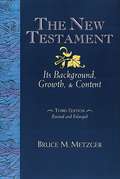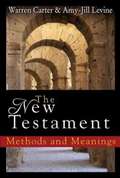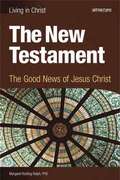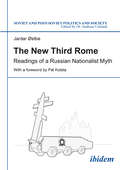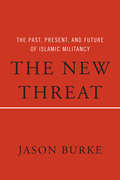- Table View
- List View
The New Testament in Antiquity, 2nd Edition: A Survey of the New Testament within Its Cultural Contexts
by Gary M. Burge Gene L. GreenThis completely revised and updated second edition of The New Testament in Antiquity skillfully develops how Jewish, Hellenistic, and Roman cultures formed the essential environment in which the New Testament authors wrote their books and letters. Understanding of the land, history, and culture of the ancient world brings remarkable new insights into how we read the New Testament itself.Throughout the book, numerous features provide windows into the first-century world. Nearly 500 full color photos, charts, maps, and drawings have been carefully selected. Additional features include sidebars that integrate the book's material with issues of interpretation, discussion questions, and bibliographies.
The New Testament in Antiquity: A Survey of the New Testament Within Its Cultural Contexts
by Gary M. Burge Lynn H. Cohick Gene L. Green BurgeThe New Testament in Antiquity is a textbook for college and seminary students penned by three evangelical scholars with over fifty years of combined experience in the classroom. Their challenge was to build a text that would be engaging, academically robust, richly illustrated, and relevant to the modern student. This book strikes a balance between being accessible to all students and challenging them to explore the depths of the New Testament within its cultural worlds. The New Testament in Antiquity carefully develops how Jewish and Hellenistic cultures formed the essential environment in which the New Testament authors wrote their books and letters. It argues that knowing the land, history, and culture of this world brings remarkable new insights into how we read the New Testament itself. Numerous sidebars provide windows into the Jewish, Hellenistic, and Roman worlds and integrate this material directly with the interpretation of the literature of the New Testament. This is an ideal introductory text for classroom use, with ample discussion questions and bibliographies.
The New Testament in Antiquity: A Survey of the New Testament within Its Cultural Context
by Gary M. Burge Lynn H. Cohick Gene L. GreenThe New Testament in Antiquity is a textbook for college and seminary students penned by three evangelical scholars with over fifty years of combined experience in the classroom. Their challenge was to build a text that would be engaging, academically robust, richly illustrated, and relevant to the modern student. This book strikes a balance between being accessible to all students and challenging them to explore the depths of the New Testament within its cultural worlds. The New Testament in Antiquity carefully develops how Jewish and Hellenistic cultures formed the essential environment in which the New Testament authors wrote their books and letters. It argues that knowing the land, history, and culture of this world brings remarkable new insights into how we read the New Testament itself. Numerous sidebars provide windows into the Jewish, Hellenistic, and Roman worlds and integrate this material directly with the interpretation of the literature of the New Testament. This is an ideal introductory text for classroom use, with ample discussion questions and bibliographies.
The New Testament in Color: A Multiethnic Bible Commentary
by Osvaldo Padilla Esau McCaulley Janette H. Ok Amy L. B. PeelerIn this one-volume commentary, a multiethnic team of scholars holding orthodox Christian beliefs brings exegetical expertise coupled with a unique interpretive lens to illuminate the ways social location and biblical interpretation work together. These diverse scholars offer a better vantage point for both the academy and the church.
The New Testament in Its World Workbook: An Introduction to the History, Literature, and Theology of the First Christians
by N. T. Wright Michael F. BirdThis workbook accompanies The New Testament in Its World by N. T. Wright and Michael F. Bird. Following the textbook's structure, it offers assessment questions, exercises, and activities designed to support the students' learning experience. Reinforcing the teaching in the textbook, this workbook will not only help to enhance their understanding of the New Testament books as historical, literary, and social phenomena located in the world of early Christianity, but also guide them to think like a first-century believer while reading the text responsibly for today.
The New Testament in Its World: An Introduction to the History, Literature, and Theology of the First Christians
by N. T. Wright Michael F. BirdFinally: an introduction that captures the excitement of the early Christians, helping today's readers to think like a first-century believer while reading the text responsibly for today. The New Testament in Its World is your passageway from the twenty-first century to the era of Jesus and the first Christians. A highly-readable, one-volume introduction placing the entire New Testament and early Christianity in its original context, it is the only such work by distinguished scholar and author N. T. (Tom) Wright.An ideal guide for students, The New Testament in Its World addresses the many difficult questions faced by those studying early Christianity. Both large and small, these questions include:What is the purpose of the New Testament?What was the first-century understanding of the kingdom?What is the real meaning of the resurrection in its original context?What really were the Gospels?Who was Paul and why are his letters so controversial?As twenty-first-century people, how do we recover the excitement of what it was like to live as Christians in the first or second centuries?In short, The New Testament in Its World brings together decades of ground-breaking research, writing, and teaching into one volume that will open readers' eyes to the larger world of the New Testament. It presents the New Testament books as historical, literary, and social phenomena located in the world of Second Temple Judaism, amidst Greco-Roman politics and culture, and within early Christianity. 'Written for both classroom and personal use, the benefits of The New Testament in Its World include:A distillation of the life work of N. T. Wright on the New Testament with input from Michael BirdHistorical context that situates Jesus and the early church within the history, culture, and religion of Second Temple Judaism and the Greco-Roman worldMajor sections on the historical Jesus, the resurrection of Jesus, and Paul's chronology and theologySurveys of each New Testament book that discuss their significance, critical topics like authorship and date, and that provide commentary on contents along with implications for the Christian lifeUp-to-date discussions of textual criticism and the canonization of the New TestamentA concluding chapter dedicated to living the story of the New TestamentAvailable Video and Workbook companion resources to enhance learning and experience the world of the New TestamentIllustrated with visually rich pictures, maps, charts, diagrams, and artwork; plentiful sidebars provide additional explanations and insights
The New Testament in Muslim Eyes: Paul's Letter to the Galatians (Routledge Reading the Bible in Islamic Context Series)
by Shabbir AkhtarThis book explores Christian origins by examining a key New Testament epistle, Paul’s letter to the Galatian churches, seen by Christians as the charter of Christian liberty from the inherited Jewish law. The New Testament in Muslim Eyes provides a close textual commentary on perhaps the earliest declaration of Paul’s apostleship and of his undying commitment to the risen Christ. It notes the subtleties of the Greek original against the backdrop of an exciting glimpse of Quranic Arabic parallels and differences. It asks: Does Paul qualify as a prophet of Allah (God)? The thoughts of Paul are assessed by examining his claims against the background of Islam’s rival views of Abraham and his legacy. The Arabic Quran framed and inspired the life of the Arab Apostle, Muhammad, who was sent, according to Islam, to all humanity, Jewish and Gentile alike. Pauline themes are set in dialectical tension with the claims of the Quran. Akhtar compares and contrasts the two rival faiths with regard to: the resources of human nature, the salvation of the sinner, and the status of the works of the law. Both Christians and Muslims concur on the need for God’s grace, an essential condition of success in the life of faith. The core Pauline Christian doctrine of justification by faith alone is scrutinised and assessed from a variety of non-Christian, especially Islamic, stances. Providing an Islamic view of Christian origins, this book helps to build bridges between the two religions. It will be a valuable resource to students and scholars of Biblical Studies, Islamic Studies, and the Philosophy of Religion.
The New Testament in Scots: The New Testament In Scots (Canongate Classics)
by William Laughton LorimerThis &“majestic work of scholarship&” by the renowned classicist is &“a notable contribution to [Scottish] literary and linguistic heritage&” (The Times, London). The Greek scholar William Lorimer spent the last ten years of his life translating the New Testament into the native language of Scotland. It was a passion project that would become his posthumous masterwork. Translated directly from original Greek sources, each Gospel is written in a different form of Scots to match the different forms of Greek used by the various apostles and scribes, and the vigor and immediacy of the language is everywhere apparent. Transcribed, edited and published by his son Robin Lorimer, this scholarly and dramatically fresh reading of an already familiar text caused a sensation when it first appeared in 1983. Beyond the poetry of the King James version, here are the voices of the disciples themselves, speaking, as they undoubtedly did, in &‘plain braid Galilee&’. &“A great literary achievement in its own right . . . [that] not only restores life to Scots but to the New Testament itself.&” —The Scotsman
The New Testament in Seven Sentences: A Small Introduction to a Vast Topic (Introductions in Seven Sentences)
by Gary M. BurgeWe often explore individual passages of Scripture without seeing the whole. A verse may be inspiring and easy to grasp, but the sweeping context is often difficult and requires persistence. To understand the breadth of the gospel's message, we need to perceive the full tapestry of Scripture with its theological themes woven together. Otherwise, we miss the scope of what Jesus is doing in the New Testament, gaining mere glimpses of his activity or teaching but missing their significance. Gary M. Burge aims to weave this larger tapestry so that each part of the story takes on richer meaning. Using seven key sentences drawn straight from the New Testament, Burge demonstrates how the themes of fulfillment, kingdom, cross, grace, covenant, spirit, and completion set a theological rhythm for our faith. The seven include "You are the Messiah, the son of the living God!" "By grace you have been saved, through faith … not by works." "You are a chosen people, a royal priesthood, a holy nation, God’s special possession." "I saw a new heaven and a new earth." These sentences are not only individually inspiring, but they outline the broader pattern of Scripture that illustrates what God has done—and is bringing to fulfillment—in Christ.
The New Testament in its Ritual World
by Richard E. DeMarisWhat was life like among the first Christians? For the last thirty years, scholars have explored the historical and social contexts of the New Testament in order to sharpen their understanding of the text itself. This interest has led scholars to focus more and more on the social features of early Christian communities and less on their theologies or doctrines. Scholars are keen to understand what these communities were like, but the ritual life of early Christians remains largely unexplored. Studies of baptism and eucharist do exist, but they are very traditional, showing little awareness of the ritual world, let alone the broader social environment, in which Christians found themselves. Such studies make little or no use of the social sciences, Roman social history, or the archaeological record. This book argues that ritual was central to, and definitive for, early Christian life (as it is for all social orders), and explores the New Testament through a ritual lens. By grounding the exploration in ritual theory, Greco-Roman ritual life, and the material record of the ancient Mediterranean, it offers new and insightful perspectives on early Christian communities and their cultural environment. In doing justice to a central but slighted aspect of community life, it outlines an alternative approach to the New Testament, one that reveals what the lives of the first Christians were actually like.
The New Testament: A Beginner's Guide (Beginner's Guides)
by W. R. TelfordThe New Testament writings are the foundation documents of early Christianity, and to fully understand them readers need a broad historical awareness of the wider social, economic, political and religious context that produced them. Here, Telford paints a fascinating portrait of the Roman and Hellenistic Empires and the growth of the early church, elucidating the composition and content of the Synoptic Gospels - those of Matthew, Mark, and Luke. Furnishing the reader with an appreciation of the methods contemporary scholars apply to the Gospels, he also offers an assured, in-depth guide to the texts themselves. Punctuated by charts and tables and unlike other introductions for the general reader, this richly contextualized and accessible narrative is an invaluable starting point for anyone looking to understand the Gospels and the roots of Christianity.
The New Testament: A Contemporary Introduction
by Colleen M. ConwayAn accessible introduction to the New Testament, offering up-to-date historical-critical scholarship and diverse critical perspectives The New Testament: A Contemporary Introduction presents a concise account of the emergence of Jesus traditions in the broader context of ancient Mediterranean history. Incorporating established historical approaches and alternative academic analyses, this innovative textbook helps students understand the historical and political contexts of the authors and their audiences, and how different social identities and lived experiences influenced the formation of the Bible and its later interpretations. Accomplished scholar Colleen Conway emphasizes the cultural and literary context of the New Testament while drawing from historical, postcolonial, gender, feminist, and intersectional analyses of biblical texts. Throughout the book, students explore how issues of race, class, gender, sexual orientation, and power dynamics contributed to the production of the New Testament texts and continue to inform their interpretation in the 21st century. Through twelve chronologically organized chapters, this book examines Paul's mission to the Gentiles, unity and conflict in Paul's communities, the four Gospel narratives, the Revelation to John, Hebrews, 1 Peter, the New Testament canon, early Christian writings, and more. The New Testament: A Contemporary Introduction: Provides an up-to-date introduction to historical and critical methods and central questions in the field Helps students contextualize the different writings of the New Testament as part of the Mediterranean world of the first century, for example exploring how Roman Imperial rule and social stratification affected the authors of New Testament texts Discusses how ideas about gender and race affect the meaning and application of New Testament texts Features "Contemporary Voices" sections highlighting the work of modern New Testament scholars Includes numerous pedagogical tools such as chapter review questions, key term lists, suggested readings, a timeline, maps, illustrations, photographs, a glossary, and much more Designed for undergraduate students with varying levels of biblical knowledge, The New Testament: A Contemporary Introduction is an ideal textbook for one-semester religious studies courses on the Bible, the New Testament, or early Christianity, as well as undergraduate and graduate students in history, sociology and philosophy.
The New Testament: A Historical Introduction to the Early Christian Writings
by Bart D. EhrmanFeaturing vibrant full color throughout, the seventh edition of Bart D. Ehrman's highly successful introduction approaches the New Testament from a consistently historical and comparative perspective, emphasizing the rich diversity of the earliest Christian literature. Distinctive to this study is its unique focus on the historical, literary, and religious milieux of the Greco Roman world, including early Judaism. As part of its historical orientation, the book also discusses other Christian writings that were roughly contemporary with the New Testament, such as the Gospel of Thomas, the Apocalypse of Peter, and the letters of Ignatius.
The New Testament: A Historical Introduction to the Early Christian Writings (Fifth Edition)
by Bart D. EhrmanThe fifth edition of Bart D. Ehrman's highly successful introduction approaches the New Testament from a consistently historical and comparative perspective, emphasizing the rich diversity of the earliest Christian literature. Distinctive to this study is its unique focus on the historical, literary, and religious milieux of the Greco-Roman world, including early Judaism. As part of its historical orientation, the book also discusses other Christian writings that were roughly contemporary with the New Testament, such as the Gospel of Thomas, the Apocalypse of Peter, and the letters of Ignatius.
The New Testament: A Translation
by David Bentley HartFrom one of our most celebrated writers on religion comes this fresh, bold, and unsettling new translation of the New Testament David Bentley Hart undertook this new translation of the New Testament in the spirit of "etsi doctrina non daretur," "as if doctrine is not given. " Reproducing the texts' often fragmentary formulations without augmentation or correction, he has produced a pitilessly literal translation, one that captures the texts' impenetrability and unfinished quality while awakening readers to an uncanniness that often lies hidden beneath doctrinal layers. The early Christians' sometimes raw, astonished, and halting prose challenges the idea that the New Testament affirms the kind of people we are. Hart reminds us that they were a company of extremists, radical in their rejection of the values and priorities of society not only at its most degenerate, but often at its most reasonable and decent. "To live as the New Testament language requires," he writes, "Christians would have to become strangers and sojourners on the earth, to have here no enduring city, to belong to a Kingdom truly not of this world. And we surely cannot do that, can we?"
The New Testament: A Translation
by David Bentley HartThe second edition of David Bentley Hart’s critically acclaimed New Testament translation David Bentley Hart’s translation of the New Testament, first published in 2017, was hailed as a “remarkable feat” and as a “strange, disconcerting, radical version of a strange, disconcerting manifesto of profoundly radical values.” In this second edition, which includes a powerful new preface and more than a thousand changes to the text, Hart’s purpose remains the same: to render the original Greek texts faithfully, free of doctrine and theology, awakening readers to the uncanniness that often lies hidden beneath doctrinal layers. Through his startling translation, with its raw, unfinished quality, Hart reveals a world conceptually quite unlike our own. “It was a world,” he writes, “in which the heavens above were occupied by celestial spiritual potentates of questionable character, in which angels ruled the nations of the earth as local gods, in which demons prowled the empty places, . . . and in which the entire cosmos was for many an eternal divine order and for many others a darkened prison house.” He challenges readers to imagine it anew: a God who reigned on high, appearing in the form of a slave and dying as a criminal, only then to be raised up and revealed as the Lord of all things.
The New Testament: A Very Short Introduction (Very Short Introductions Series)
by Luke Timothy JohnsonAs ancient literature and a cornerstone of the Christian faith, the New Testament has exerted a powerful religious and cultural impact. But how much do we really know about its origins? Who were the people who actually wrote the sacred texts that became part of the Christian Bible? The New Testament: A Very Short Introduction authoritatively addresses these questions, offering a fresh perspective on the underpinnings of this profoundly influential collection of writings. <P><P>In this concise, engaging book, noted New Testament scholar Luke Timothy Johnson takes readers on a journey back to the time of the early Roman Empire, when the New Testament was written in ordinary Greek (koine) by the first Christians. The author explains how the Gospels, Acts of the Apostles, and Revelation evolved into the canon of sacred writings for the Christian religion, and how they reflect a reinterpretation of the symbolic world and societal forces of first-century Greco-Roman and Jewish life. Equally important, readers will find both a positive and critical reading of the New Testament—one that looks beyond its theological orientation to reveal an often-surprising diversity of viewpoints. <P><P>This one-of-a-kind introduction engages four distinct dimensions of the earliest Christian writings—anthropological, historical, religious, and literary—to provide readers with a broad conceptual and factual framework. In addition, the book takes an in-depth look at compositions that have proven to be particularly relevant over the centuries, including Paul's letters to the Corinthians and Romans and the Gospels of John, Mark, Matthew, and Luke. Ideal for general readers and students alike, this fascinating resource characterizes the writing of the New Testament not as an unknowable abstraction or the product of divine intervention, but as an act of human creativity by people whose real experiences, convictions, and narratives shaped modern Christianity.
The New Testament: An Expanded Translation (Word Studies In The Greek New Testament Ser.)
by Kenneth S. WuestUnlike other versions of the New Testament, this translation uses as many English words as are necessary to bring out the richness, force, and clarity of the Greek Text. Intended as a companion to, or commentary on, the standard translations, Wuest's "expanded translation" follows the Greek word order and especially reflects emphases and contrasts indicated by the original text.
The New Testament: God's Message Of Goodness, Ease And Well-being, Which Brings God's Gifts Of His Spirit, His Life, His Grace, His Power, His Fairness, His Peace, And His Love
by Jonathan Paul MitchellMultiple possible translations of the Greek text are presented in Mitchell's translation of "The New Testament. " Expanded renderings of the Greek verb tenses are presented along with optional functions of noun and adjective cases.
The New Testament: Its Background and Message
by Thomas D. Lea David Alan BlackIn the comprehensive <i>The New Testament: Its Background and Message</i>, the late Thomas Lea presented a clear and concise introduction to the New Testament giving readers the key that unlocks the door to understanding these important texts. This influential work presents the background of the New Testament with broad strokes and with a focus on specific books including the Gospels, Acts, and Paul and his letters. Originally written in an easy-to-understand style and form, Lea’s text continues to unlock the message of the New Testament for both new students and seasoned scholars.
The New Testament: Its Background, Growth, and Content (3rd Edition, Revised and Enlarged)
by Bruce M. MetzgerTextbook covering the background, growth, and content of the New Testament.
The New Testament: Methods and Meanings (Core Biblical Studies #No. 204)
by Amy-Jill Levine Warren CarterIn this concise, accessible book, Warren Carter and A.J. Levine introduce three aspects of New Testament study: the world of the text (plots, characters, setting, and themes), the world behind the text (the concerns, circumstances, and experiences of the early Christian communities), and the world in front of the text (the meaning for contemporary readers). As students engage the New Testament, they face a central issue that has confronted all students before them, namely, that these texts have been and are read in diverse and often quite conflicting ways. These multiple readings involve different methods: historical-critical, traditional (history of interpretation), colonial, multicultural, and sociological, with feminist and liberationist implications for the first-century readers as well as the ongoing implications for today's reader. For example, Carter and Levine show how a text can be used by both colonizer and colonized, feminist and anti-feminist, or pro- and anti-Jewish. The authors also show how scholarly work can be both constructive and threatening to the contemporary Church and how polemical texts can be used, whether for religious study, theological reflection, or homiletical practice."... a brilliant contemporary representative of the biblical discipline of the Einleitung, Introduction. ... In the best tradition of historical-critical biblical scholarship, Carter and Levine advocate a respectful, critical and generous engagement with the texts, involving readers in finding meanings. ... There are many gems in the heart of this book, including excursuses in shaded boxes, and some misguided traditional interpretations are safely despatched. Dagmar Winter, Journal for the Study of The New Testament Booklist 2015
The New Testament: The Good News of Jesus Christ
by Margaret Nutting RalphThe purpose of this course is to provide an in depth study of the New Testament. Since Jesus Christ's life, death, and Resurrection are at the heart of the Christian mystery this course will begin by looking at the four complementary but unique portraits of Jesus that are found in the four Gospels. Next it will trace the spread of the Gospel as told in Acts and the Letters. The course will also consider the challenges faced by the early Church that emerge through a careful reading of the New Testament Letters and the Book of Revelation. Additionally, it will look closely at what his followers in the early Church proclaimed about him and explore the historical, religious and cultural world of Jesus' time. Ultimately, the course will guide students in seeing the relevance of the Gospel message for the world today. The Living in Christ Series Makes the most of the wisdom and experience of Catholic high school teachers as they empower and guide students to participate in their own learning. Engages students' intellect and responds to their natural desire to know God. Encourages faith in action through carefully-crafted learning objectives, lessons, activities, active learning, and summative projects that address multiple learning styles. What you will find: Each Living in Christ student book is developed in line with the U. S. Bishops' High School Curriculum Framework and provides key doctrine essential to the course in a clear and accessible way, making it relevant to the students and how they live their lives. Each Living in Christ teacher guide carefully crafts the lessons, based on the key principles of Understanding by Design, to guide the students' understanding of key concepts. Living in Christ offers an innovative, online learning environment featuring flexible and customizable resources to enrich and empower the teacher to respond to the diverse learning needs of the students. The Living in Christ series is available to you in traditional full-color text and in digital textbook format, offering you options to meet your preferences and needs.
The New Third Rome: Readings of a Russian Nationalist Myth (Soviet and Post-Soviet Politics and Society #151)
by Jardar ØstbøDrawing on theories of political myth and concepts of nationalism, Jardar Østbø analyzes the content and ideological function of the myth of Russia as a Third Rome. Through case studies of four prominent nationalist intellectuals, Østbø shows how this messianic myth was used to reinvent Russia and its allegedly rightful place in the world after the collapse of the Soviet Union. Though it exists in many radically different versions, the Third Rome myth in general embodies particularism and rabid anti-Westernism. At best, it portrays Russia as an essentially isolationist country. At worst, it casts the country as superior to all other nations, divinely elected to rule the world.
The New Threat
by Jason BurkeJason Burke is one of the world's leading experts on militant Islam. He embedded with the Kurdish peshmerga (currently at war with ISIS) while still in college. He was hanging out with the Taliban in the late 1990s. He witnessed the bombing of Tora Bora in Afghanistan in 2001 firsthand.With the current emergence of ISIS in Iraq and Syria and the resurgence of the Taliban in Afghanistan and Pakistan, no one is as well placed as Burke-whose previous books have been chosen as books of the year by The Economist, the Daily Telegraph, and The Independent-to explain this dramatic post-Al Qaeda phase of Islamic militancy. We are now, he argues, entering a new phase of radical violence that is very different from what has gone before, one that is going to redefine the West's relationship with terrorism and the Middle East.ISIS is not "medieval," as many U.S. national security pundits claim, but, Burke explains, a group whose spectacular acts of terror are a contemporary expression of our highly digitized societies, designed to generate global publicity. In his account, radical Islamic terrorism is not an aberration or "cancer," as some politicians assert; it is an organic part of the modern world. This book will challenge the preconceptions of many American readers and will be hotly debated in national security circles.
